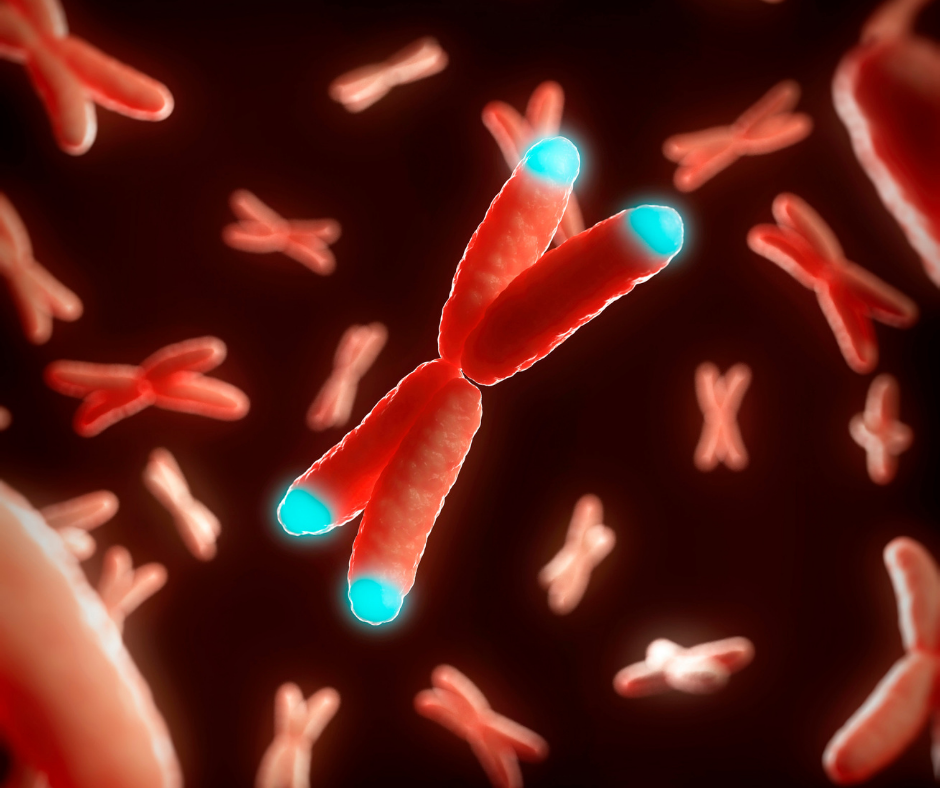

Telomeres are the endcaps of human chromosomes that protect the ends of DNA strands from shortening and fraying.
Science shows telomeres play a vital role in the aging process, so the premature shortening of these pesky proteins is something you want to prevent — short telomeres are associated with many aging diseases.
So how can you lengthen or maintain healthy telomeres?
Well, there is this enzyme called telomerase that can slow, stop, or potentially reverse telomere shortening as we age.
The thing is, you can’t take a telomerase supplement. Yet.
But you could do telomerase gene therapy with BioViva, a biotech company dedicated to reversing aging.
That’ll be over $100,000, please.
While we wait for time, science, and demand to drive down the price for gene therapy to something more affordable, here are some things you can do to keep your telomeres healthy.
Eat your fiber.
A study published in 2018 looked at fiber intake and telomere length in over 5,000 U.S. adults.
Researchers found there was a significant linear relationship between fiber consumption and telomere length. The more fiber subjects consumed, the longer their telomeres tended to be.
Here’s what the authors found:
“A difference of 4.8 to 6.0 years in cell aging was found between those in the lowest compared with the highest quartiles of fiber intake. Overall, the present study highlights the risk of accelerated aging among U.S. women and men who do not consume adequate amounts of dietary fiber.”
The study reported subjects were eating an average of 13.6 grams of fiber per day before starting the study, which is less than 50% of the Dietary Guidelines for Americans.
The Dietary Guidelines for Americans recommends the intake of 14 g of fiber per 1000 calories.
- 2000 calories per day = 28 grams of fiber
- 2500 calories per day = 35 grams of fiber
The best part is some of the most healthy and delicious foods pack the fiber.
It seems a few servings of high fiber foods per day keeps the telomere shortening at bay.
Don’t skip the HIIT.
High-intensity interval training, or HIIT, is a form of cardio where you alternative short bursts of high intensity with longer strides of lower intensity exercise.
A 2018 study published in the European Heart Journal compared the telomere length and telomerase activity after different exercise types.
The study involved 124 people over six months split into four groups:
- Resistance Training
- HIIT
- Endurance Training
- Control Group
Each group did three 45-minute sessions of their assigned type of exercise each week.
Researchers measured the telomere length and telomerase activity in the participant’s white blood cells before and after the study.
Surprisingly, endurance training and the HIIT group increased telomeres’ length, and resistance training did not.
But not so fast.
The resistance training group performed a circuit of 8 machine-based exercises at a 20rm (rep max).
Using loads as low as a 20rm primarily focuses on a muscular endurance adaptation through metabolic stress, very similar to the act of HIIT or endurance training.
So it’s like comparing HIIT cardio to running to cardio with weights — not exactly a fair assessment.
But while these findings are surprising, it begs the question: Would strength training with higher intensity (4–10 rep max) elicit a more favorable response?
Research on telomere length and powerlifters seems to suggest it would. In this study, powerlifters, athletes who use very high-intensity weights, showed no abnormal shortening of telomeres when compared to active individuals.
Studies also show higher levels of muscle mass decrease your risk of all-cause mortality.
It seems more research needs to be done on the topic, and you’re better off including both instead of one.
Get those omega-3s.
You’ve probably heard copious amounts of health benefits associated with omega 3s. It turns out they’re good for telomeres too.
This study on omega-3 fatty acid supplementation found that taking omega-3 supplements changes the balance of oils in the diet and could reduce cellular aging.
Researchers found the more the omega-6 to omega-3 ratio decreased, the higher association with lengthened telomeres.
So how much should you take?
In this study, the clinically effective dose was 2.5g of fish oil per day.
Maintain adequate Vitamin D levels.
Vitamin D is another vitamin touted as a panacea of health benefits, which include healthy telomeres.
Adequate vitamin d levels show a positive association with telomere length.
A study published in the Archives of Medical Science found that for each 1ng/ml higher 25(OH)D level was associated with a 0.045 longer telomere-to-single copy gene (T/S) ratio.
How do you know if you have adequate Vitamin D levels? You’ll need to test it and dose accordingly.
Relax with yoga or meditation.
Stress is a killer.
And it has a significant impact on your health, let alone your precious telomeres.
You can’t eliminate stress with a pill, but yoga and meditation show benefits for combating both stress and telomere shortening.
One study measured the impact of yogic meditation on mental health and telomerase activity. Researchers found telomerase activity improved by 43%, whereas mental health improved by 50%.
Another study found subject’s biomarkers improved significantly after three to six months of regular yoga practice.
In conclusion
We might be a few years away from an affordable telomere lengthening intervention, but there’s plenty you can do today to lengthen your telomeres or prevent premature shortening.